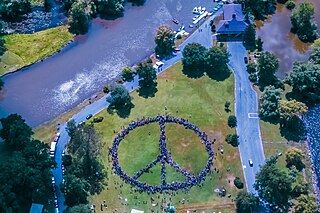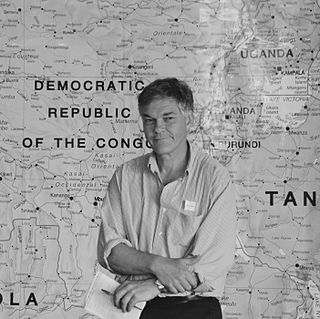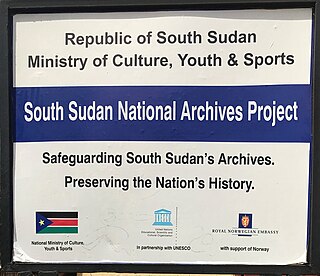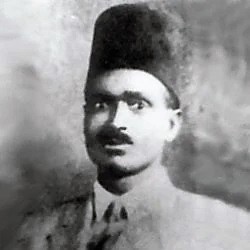
The Great Rift Valley is a series of contiguous geographic depressions, approximately 6,000 or 7,000 kilometres (4,300 mi) in total length, the definition varying between sources, that runs from the southern Turkish Hatay Province in Asia, through the Red Sea, to Mozambique in Southeast Africa. While the name remains in some usages, it is rarely used in geology as it is considered an imprecise merging of rift and fault systems.

The University for Peace (UPEACE) is an international university and intergovernmental organization established as a treaty organisation by the United Nations General Assembly in 1980. The university offers postgraduate, doctoral, and executive programmes related to the study of peace and conflict, environment and development, and international law.

The rich and varied music of Sudan has traditional, rural, northeastern African roots and also shows Arabic, Western or other African influences, especially on the popular urban music from the early 20th century onwards. Since the establishment of big cities like Khartoum as melting pots for people of diverse backgrounds, their cultural heritage and tastes have shaped numerous forms of modern popular music. In the globalized world of today, the creation and consumption of music through satellite TV or on the Internet is a driving force for cultural change in Sudan, popular with local audiences as well as with Sudanese living abroad.
Higher education in Mauritius includes colleges, universities and other technical institutions. Public university education has been free to students since 2019. The sector is managed by the Higher Education Commission (HEC) which has the responsibility for allocating public funds, and fostering, planning and coordinating the development of post-secondary education and training. Formerly the Tertiary Education Commission, in 2020 it was reformed into the HEC and a separate Quality Assurance Authority (QAA) for auditing of qualifications.

The United Nations Institute for Training and Research (UNITAR) is a dedicated training arm of the United Nations system. UNITAR provides training and capacity development activities to assist mainly developing countries with special attention to Least Developed Countries (LDCs), Small Island Developing States (SIDS) and other groups and communities who are most vulnerable, including those in conflict situations.
Development studies is an interdisciplinary branch of social science. Development studies is offered as a specialized master's degree in a number of reputed universities around the world. It has grown in popularity as a subject of study since the early 1990s, and has been most widely taught and researched in developing countries and countries with a colonial history, such as the UK, where the discipline originated. Students of development studies often choose careers in international organisations such as the United Nations, World Bank, non-governmental organisations (NGOs), media and journalism houses, private sector development consultancy firms, corporate social responsibility (CSR) bodies and research centers.
The International Foundation for Electoral Systems (IFES) is an international, non-profit organisation founded in 1987. Based in Arlington, Virginia, United States, the organization assists and supports elections and electoral stakeholders. Since 1987, IFES has worked in 145 countries and has programs in more than 50 countries throughout Asia-Pacific, Africa, Eurasia, the Middle East, and North Africa, and the Americas.

Slavery in Sudan began in ancient times, and had a resurgence during the Second Sudanese Civil War (1983–2005). During the Trans-Saharan slave trade, many Nilotic peoples from the lower Nile Valley were purchased as slaves and brought to work elsewhere in North Africa and the Orient by Nubians, Egyptians, Berbers and Arabs.

The Technical Centre for Agricultural and Rural Cooperation ACP-EU (CTA) was established in 1983 under the Lomé Convention between the African, Caribbean and Pacific Group of States and EU member states. Since 2000 CTA has operated within the framework of the ACP-EU Cotonou Agreement with a mission to “strengthen policy and institutional capacity development and information and communication management capacities of ACP agricultural and rural development organisations. It assists such organisations in formulating and implementing policies and programmes to reduce poverty, promote sustainable food security, preserve the natural resource base and thus contribute to building self-reliance in ACP rural and agricultural development.”. The centre is closed in 2020, after the end of the Cotonou Agreement and the subsequent end of its financing.

Peacebuilding is an activity that aims to resolve injustice in nonviolent ways and to transform the cultural and structural conditions that generate deadly or destructive conflict. It revolves around developing constructive personal, group, and political relationships across ethnic, religious, class, national, and racial boundaries. The process includes violence prevention; conflict management, resolution, or transformation; and post-conflict reconciliation or trauma healing before, during, and after any given case of violence.
Concordis International is a non-profit organization that works alongside and in support of official peace processes. They exist to improve the potential for lasting peace. The organization has headquarters in London and country-offices in the Central African Republic and Nouakchott, Mauritania. Concordis' historical roots are in peace-building work by the Newick Park Initiative in South Africa (1986–1991) and in post-genocide Rwanda (1994–1997).

John Rowland Ryle OBE is a British writer, anthropologist, social activist, filmmaker, teacher and publisher, with an interest in the history and culture of Eastern Africa. He is co-founder of the Rift Valley Institute, and Legrand Ramsey Professor of Anthropology at Bard College, New York.

Rift Valley Technical Training institute (RVTTI) is a public technical training institute located in the highland city of Eldoret, Kenya. It is one of the Technical Training Institutes in Kenya. The institution offers Artisan, Craft, Diploma and Higher Diploma Courses with bias to practical industrial applications.

The National Archive of South Sudan is located in Juba, South Sudan. The collection consists of tens of thousands of Sudanese and Southern Sudanese government documents running from the early 1900s, through the independence of Sudan in 1956 and Sudan's First (1955–1972) and Second (1983–2005) civil wars, to the late 1990s. The archives are run by the Ministry of Culture, Youth and Sports in Juba, South Sudan.

Zeremariam Fre is an agriculturalist, specialising in the drylands, and is of dual Eritrean-British nationality. He is the founder and former director of the Pastoral and Environmental Network in the Horn of Africa (PENHA), where he now serves on the Board of Trustees as Treasurer.
Sudan Memory is an online archive and cultural heritage project, provided by an international group of partners with the aim of conserving and promoting Sudanese cultural heritage. In the course of the project, digital reproductions of books and newspapers, photographs and films, visual art and architecture, as well as of other cultural objects in Sudan were created and published on the project's website.

Khalil Farah was a Sudanese singer, composer and poet, who wrote his lyrics both in Sudanese colloquial as well as in Modern Standard Arabic. He is considered as one of the most prominent pioneers of the early 20th century renewal in singing and poetry in Sudan.
The College of Fine and Applied Art in Khartoum is the only public art school in Sudan. Its predecessor was founded by the British administration in 1945 as School of Design in the former Gordon Memorial College. In 1951, it was incorporated into the Khartoum Technical Institute that became the Sudan University of Science and Technology (SUST) in 1971, and the school was renamed College of Fine and Applied Art.
Hala al-Karib or Hala Alkarib is a Sudanese activist against sexual violence in war. She is the regional director of the Strategic Initiative for Women in the Horn of Africa (SIHA).











